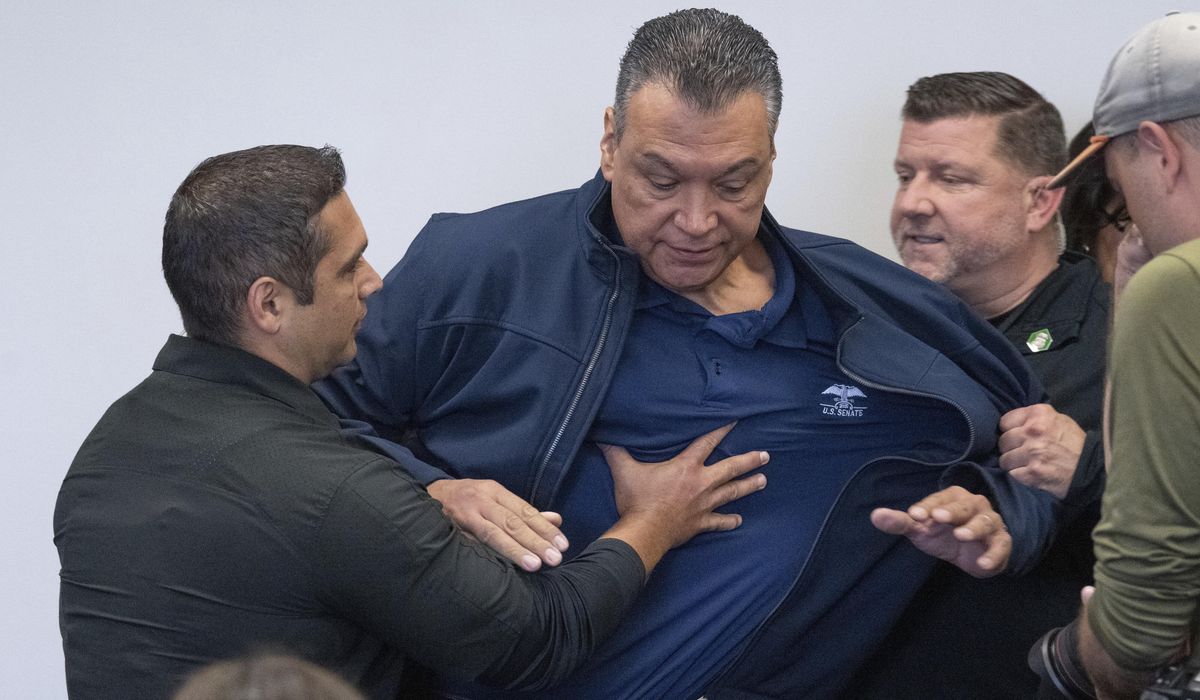ARTICLE AD BOX
Vice President J.D. Vance rushed to President Trump’s defense amid concerns the U.S. is poised to take military action against Iran, saying the commander in chief should be trusted and is “only interested in using the American military to accomplish the American people’s goals.”
“He may decide he needs to take further action to end Iranian enrichment. That decision ultimately belongs to the president. And, of course, people are right to be worried about foreign entanglement after the last 25 years of idiotic foreign policy,” Mr. Vance said on X.
“But I believe the president has earned some trust on this issue,” the vice president added. “And having seen this up close and personal, I can assure you that he is only interested in using the American military to accomplish the American people’s goals. Whatever he does, that is his focus.”
A possible strike against Iran has split Mr. Trump’s MAGA movement. Some of his most ardent allies — including Rep. Marjorie Taylor Greene, Georgia Republican, and online commentators Tucker Carlson and Steve Bannon — have warned against U.S. involvement in the Israel-Iran conflict.
They have questioned the sense of urgency around the situation and highlighted how Tulsi Gabbard, the director of national intelligence, testified before Congress in March that Iran was not building a nuclear weapon.
Mr. Trump dismissed her testimony, telling reporters the Iranians are “very close” to obtaining a nuke.
Some MAGA faithfuls have given Mr. Trump leeway, saying he’s sticking with MAGA’s America First agenda by seeking to protect the nation’s interests on the world stage.
Mr. Vance posted that Mr. Trump has been “amazingly consistent, over 10 years, that Iran cannot have a nuclear weapon.”
The vice president added, “Over the last few months, he encouraged his foreign policy team to reach a deal with the Iranians to accomplish this goal. The president has made clear that Iran cannot have uranium enrichment. And he said repeatedly that this would happen one of two ways — the easy way or the ‘other’ way.”
Mr. Vance said the Iranians have “enriched uranium far above the level necessary for any civilian purposes” and said the International Atomic Energy Agency — “which is hardly a rightwing organization” — has found them to be in “violation of their nonproliferation obligations.”
The vice president said he hasn’t seen a good argument for Iran’s actions.
“It’s one thing to want civilian nuclear energy. It’s another thing to demand sophisticated enrichment capacity,” he said. “And it’s still another to cling to enrichment while simultaneously violating basic nonproliferation obligations and enriching right to the point of weapons-grade uranium.”
Mr. Trump left the Group of Seven in Canada early Monday, citing more pressing issues to handle, namely the Mideast conflict.
“President Trump had a great day at the G7, even signing a major trade deal with the United Kingdom and Prime Minister Keir Starmer. Much was accomplished, but because of what’s going on in the Middle East, President Trump will be leaving tonight after dinner with Heads of State,” White House press secretary Karoline Leavitt wrote on social media Monday.
The G7 doesn’t end until Tuesday.
Iran and Israel keep launching strikes at each other over Iran’s defiance of giving up its nuclear program, and Mr. Trump must weigh whether the U.S. will get involved.
He boasted on Truth Social Tuesday, “We now have complete and total control of the skies over Iran.”
He added, “Iran had good sky trackers and other defensive equipment, and plenty of it, but it doesn’t compare to American made, conceived and manufactured ‘stuff.’ Nobody does it better than the good ol’ USA.”
He went on with more posts:
“We know exactly where the so-called ‘Supreme Leader’ is hiding.”
“He is an easy target, but is safe there — We are not going to take him out (kill!), at least not for now. But we don’t want missiles shot at civilians, or American soldiers. Our patience is wearing thin.”
This is the first time he used “we” to refer to the attacks on Iran, which is a shift from his previous attempts to distance the U.S. from Israel’s campaign.

 5 hours ago
5
5 hours ago
5








 English (US) ·
English (US) ·